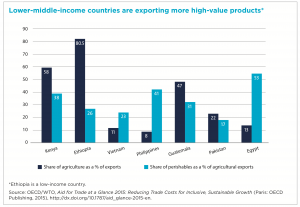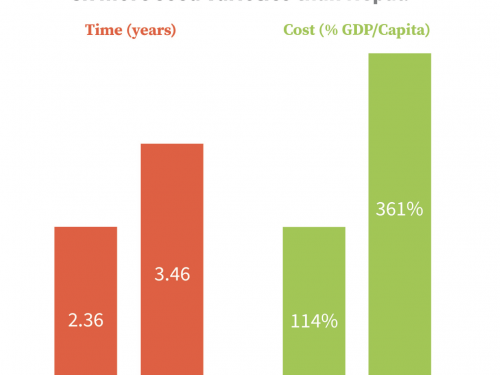
Growing Markets for Farmers through Trade Facilitation
CLIENT: Chicago Council on Global Affairs
PROJECT: Develop Recommendations to Congress and Policymakers on Advancing Food Security through Trade Facilitation
The ability to move food efficiently, cheaply, and safely across borders is crucial to linking small commercial farmers from national markets to larger regional markets, creating a virtuous cycle of demand for increased production to meet need in international markets. An increase in efficiency at international borders also supports US farmers, potentially boosting agricultural exports.
Even though the majority of food produced in the world is consumed locally, global trade in agriculture and food products has grown significantly in the last three decades. In 1980, the value of agriculture and food trade is estimated to have been $230 billion. By 2015, global trade had grown to $1.77 trillion in agriculture and $1.49 trillion in food products.
Perishable foods have become a particularly important growth category in global trade. They are essential for improving nutrition and provide a critical opportunity to grow the incomes of smaller producers in developing countries. But perishable foods are most vulnerable to trade delays or mishandling at international borders, which can compromise safety and quality and result in both food waste and income loss.

Trade facilitation measures that improve the efficiency and transparency of procedures required to clear goods across national borders are critical to address these risks and opportunities. The World Trade Organization’s Trade Facilitation Agreement (TFA) came into force in 2017 and has already stimulated a global rush to improve border procedures, backed by significant investments in capacity-building assistance. However, this assistance largely neglects the food sector to date, focusing on others instead.
This original report calls for a new US program to promote trade facilitation in food. It should include action to:
- Promote agriculture community participation in national trade facilitation committees sprouting up worldwide, and in donor efforts to deliver assistance.
- Implement pilot programs to demonstrate the benefits of improving border procedures and infrastructure for trade in agricultural and food products.
- Mobilize a global focal point for scaling trade facilitation assistance worldwide designed to help developing countries implement the TFA in ways that benefit the food and agricultural sectors.
- Fill the data gap by developing methods to measure trade facilitation costs and diagnosing choke points specific to food trade in order to prioritize and target assistance to support trade in food.
Read the report




